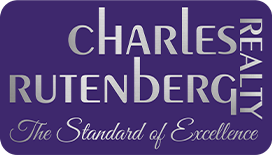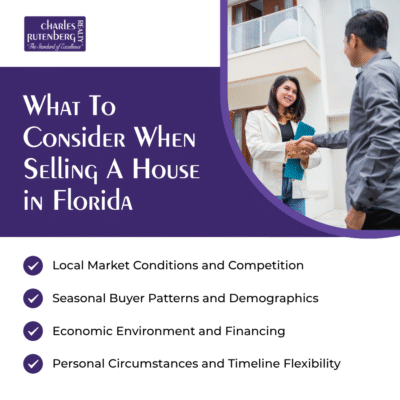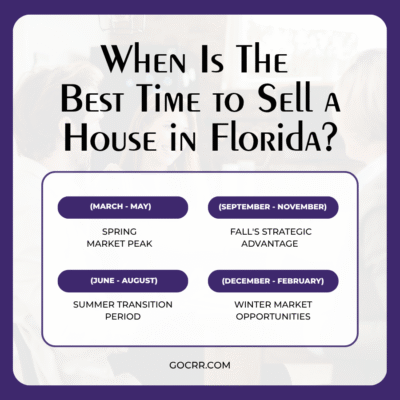
When it comes to real estate, timing is everything. Whether a home sits for months or sells in weeks often depends on knowing the moment buyers are most serious. Florida’s real estate market has a rhythm of its own, typically rewarding agents who know how to spot the right opportunities.
Real estate markets in Florida can be quite predictable. There is steady seasonal activity, snowbird migration, and frequent tourism—all things that bring clientele and drive sales. However, top agents look beneath the surface to identify the nuances that make some sales average and others extraordinary. By knowing the peak times when homebuyers are most active, agents can schedule listings to generate the most interest and encourage competitive offers.
This guide reveals the optimal seasons for listing homes, as well as key considerations to keep in mind when it’s time to list. Are you ready to become a top Florida realtor? Let’s dive in!
Best Time to Sell a House in Florida
This post offers actionable insight that agents can easily integrate into current strategies to improve listing success. In addition to the trends previously discussed, you’ll discover specific factors that drive Florida buyers to take action. Understanding these dynamics is essential to building genuine connections with buyers, making each sale feel personalized and purposeful.
You’ll also learn how to evaluate current market conditions against historical data to advise clients on timing decisions. When clients ask whether it’s time to list or hold off, you’ll be equipped with the details and data to support your recommendations. Now, it’s time to set you (and your clients) up for success.
What to Consider When Selling a House in Florida
Local Market Conditions and Competition
Understanding the market is the foundation of any effective sales strategy. This means agents need to analyze homes on the market by price point and neighborhood and then compare that data to the number of active buyers in the market. Low inventory creates a sellers market, meaning the demand is far greater than the supply. This is when you can expect skyrocketing prices, intense competition, and increased client demand. Because sale prices are often far above home prices, it’s a great opportunity for sellers to maximize their profits.
In high inventory markets, however, the supply outweighs the demand. Because there is an abundance of properties for sale, advanced price strategies and targeted marketing plans are crucial. The last thing you want is for your client’s property to become yesterday’s news. Monitoring monthly inventory reports, days-on-market trends, and listing of competing properties will help you determine the best time to list a home for sale.
With this analytics-based approach, agents can strategically position their properties, avoid saturated areas, and focus on under-supplied market niches that target serious-minded homebuyers.
Seasonal Buyer Patterns and Demographics
Florida real estate markets exhibit unique seasonal patterns that present sales opportunities to agents who have a good understanding of buyer psychology and timing. The spring and summer months are when buyers are most active, as families want to move and be settled before the new school year begins. Plus, good weather makes it easier to move.
Florida’s regional differences present extremely unique opportunities for the housing market in comparison to other areas. Naturally, coastal markets have different seasonality compared to island regions. For example, strong migration patterns are a leading source of sales in the winter.
This is when northern buyers want to move down south to escape the snow and enjoy the warm weather. Also, retirement communities operate on different buyer cycles compared to those catering to family-oriented communities. Agents that can master these nuances can time their listings to peak demand periods in their local markets.
Economic Environment and Financing
Certain macroeconomic conditions affect homebuyers purchasing power, qualifications, and overall market sentiment. Interest rate fluctuations bear directly on affordability calculations, affecting the pool of qualified buyers competing for available inventory. Higher rates generally mean buyers have less purchasing power and could face longer marketing times. On the other hand, lower rates increase the number of potential buyers and create bidding wars.
Employment numbers, consumer sentiment, and local economic development projects can also affect when and whether a buyer will make a purchase. Professional agents take these elements into consideration when performing market analyses. These insights also help home sellers better understand ongoing economic trends and what they mean for the timing and pricing of their sale.
Personal Circumstances and Timeline Flexibility
The best time to sell depends on the individual circumstances of each seller. This aspect alone can override greater market dynamics, especially when a seller’s life situation dictates immediate action. Relocating for a job, having a baby, financial hardship, loss of a family member, and divorce are some of the personal and/or economic factors that influence real estate decisions. Events like these require agents to step up to plate and develop successful yet efficient strategies.
On the other hand, clients who aren’t under time crunches can afford to wait for the right market conditions. Top agents also consider clients’ emotional states when it comes to selling their property. “Reluctant sellers” tend to do things half-heartedly or sabotage your efforts through inadequate preparation or unreasonable expectations.
When is the Best Time to Sell a House in Florida?
Spring Market Peak (March – May)
Spring marks the peak of Florida’s home-selling season, with activity ramping up as families and beach bums planning relocations as the weather is at its best. The real excitement starts in February, but March is the one bringing in bidding wars and endless offers. However, while the National Association of Realtors regards spring as the busiest selling season, Florida’s version is often prolonged with year-round appeal.
April and May keep the momentum up while urgency factors also come into play. Buyers begin to realize that putting off their purchase pushes closings into summer vacation seasons. Therefore, well-priced properties in this peak spring season often get multiple bids in a matter of days.
April and May maintain the momentum while urgency factors also come into play. Buyers begin to realize that putting off their purchase pushes closings into summer vacation seasons. Therefore, well-priced properties in this peak spring season often get multiple bids in a matter of days.
It’s up to real estate agents to capitalize on the spring market by listing in late February or early March. They can also work with sellers to make visual improvements, increasing the chances of their home attracting attention and interest. Also, well-curated marketing campaigns can generate an abundance of competitive bidding scenarios.
Summer Transition Period (June – August)
There is strong buyer activity in June, being the last month of this spring rush. This is because families rush to close deals before back-to-school preparations begin, creating the urgency that sellers love this time of year.
July brings the first summer seasonal challenge as buyer activity begins to cool. Only serious buyers remain active on the market with casual explorers taking a back seat. This leads to less competition for showing appointments and more attention directed at well-positioned properties.
August tends to be one of the most difficult times during the summer. However, the uniqueness of Florida’s features presents opportunities for retirees and empty nesters. They get to browse the market while families are busy with back-to-school preparations.
Fall’s Strategic Advantage (September – November)
Fall is often overlooked as a selling season in Florida, as some agents aren’t fully informed on this season’s benefits. September ushers in Florida’s “second season,” as winter months visitors return in droves and may even consider making Florida their new home.
October is fall’s strongest month, with seasonal residents returning and serious buyers looking to close deals before holiday interruptions. Though it is the strongest month for realtors, buyers find it favorable due to decreased competition. Don’t think that this means the market dips back into high inventory, though. Even with increased buyer interest, there are often fewer houses for sale during the month. Nonetheless, buyers are often able to find a better deal thanks to sellers rushing to sell the house before the end of the year hits. Remind your clients that, unless they have strict deadlines to be out of the home, it’s beneficial to wait for the right offer to come along.
November has its own unique urgencies, as buyers hope to secure a home before the holidays. This allows them to move in before the year’s end, providing that nice “clean slate” feeling.
Winter Market Opportunities (December – February)
Winter creates opportunities for real estate agents who know how to leverage seasonal dynamics in their favor—even in sluggish times. The distractions of the holiday season, combined with very serious buyers who are relocating with year-end deadlines to close deals, make December profitable for many agents. It’s also a good month for investors and cash buyers looking to take advantage of last-minute year-end purchases. Remember: motivated sellers and lower competition create favorable conditions.
January opens the new year wide open to new sales. This is on the heels of a new wave of buyer enthusiasm and newfound financial qualifications. February signals winter’s most potent month as seasonal residents reach their peak Florida experience levels.
When is the Worst Time to Sell a House in Florida?
Generally speaking, the winter months are by far the toughest time of year to sell in Florida. December, January, and February are usually periods of slower buyer activity, as families want to avoid disrupting the school year. Because of this, many potential relocators put off big moves until spring. Tourist-heavy regions have their own headaches during peak season as locals battle with traffic jams and shortage of contractors for pre-sale preparations.
Late summer also has its issues, especially August and early September. This is around the time when families are more focused on back-to-school preparations than house hunting. The National Association of Realtors data has long demonstrated that buyers are less active during these months, resulting in longer days on market and lower offers in many cases. With the dicey hurricane season included, buyers are faced with even more complexity, as major purchases are usually put on hold when dangerous weather is looming.
However, experienced agents know that even challenging periods can present opportunities. The winter months can bring serious buyers due to fewer competing homes on the market. What does this mean for you? Faster negotiations for well-priced homes.
Mastering the art of timing transforms good agents into exceptional ones who consistently deliver outstanding results for their clients.
The truth is that successful realtors in today’s competitive market need more than just an understanding of seasonal sales. They need the support, tools, and resources that only the finest brokerages can offer.
Charles Rutenberg Realty stands ready to support agents who are serious about taking their lead generation and market expertise to the next level. Our team of experienced professionals provides the technology, training, and collaborative environment that top-performing agents need to maximize every opportunity to have their client’s homes listed.
Don’t navigate Florida’s complex real estate markets alone. Contact Charles Rutenberg Realty today and discover how the right partnership can transform your business.





